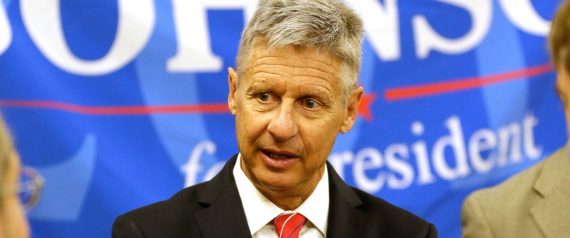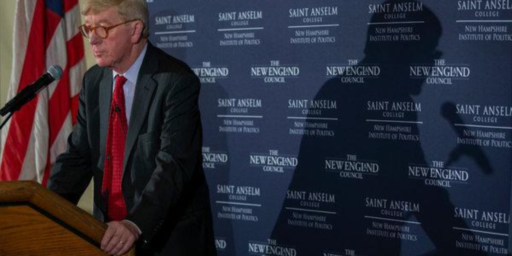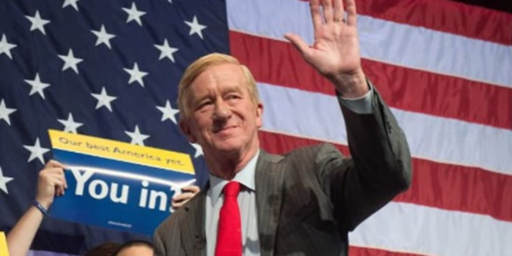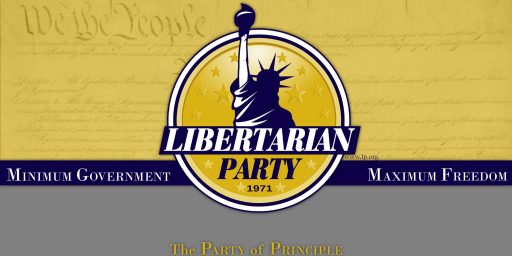Gary Johnson Selected As Libertarian Nominee For President
For the second election cycle in a row, and after a contentious floor fight, former New Mexico Governor Gary Johnson is the Libertarian Party's nominee for President.
Gary Johnson, the former Republican Governor of New Mexico who was the Libertarian nominee for President in 2012, has once again been nominated to represent the party as its Presidential nominee, setting the party up for what many hope could be an election year in which it finally gains national attention:
ORLANDO — Former New Mexico governor Gary Johnson won the Libertarian Party’s presidential nomination on Sunday, fending off five rivals from different factions on two closely fought ballots and securing more than 55.8 percent of the total vote.
“I will work as hard as I can to represent everyone in this room,” Johnson said after his victory. “After this convention, people will be looking to us to describe what it means to be a Libertarian. And I realize it will be up to me to tell them.”
But Johnson’s near-miss on the first ballot kicked off an afternoon of protests and delegate glad-handing, with the vice presidential race to be decided later. Johnson had run a careful campaign with an eye on the general election, picking former Massachusetts governor Bill Weld — like him, a Republican who switched parties — as his running mate. In Saturday night’s debate, Johnson, alone among the top-five contenders, said that he would have signed the 1964 Civil Rights Act and that he thought people should be licensed to drive cars. He was loudly booed for both positions.
“I liked it,” Johnson said in an interview before Sunday’s vote. “Let’s draw attention to the only candidate onstage saying that he would sign the Civil Rights Act, let’s draw attention to the only candidate onstage who’s in favor of driver’s licenses. I don’t know about you guys, but I think that’s a great distinction between myself and the rest of them.”
Those positions were tough to swallow for some of the party’s self-identified radicals. They’d spent the campaign season — including more than a dozen debates — labeling Johnson a “Republican-lite” candidate who could not expand on the 1 percent of the vote he had won as the 2012 nominee. Johnson was silent when the first ballot showed him just six votes short of a majority.
Johnson’s rivals, especially Libertarian activist Austin Petersen and software engineer John McAfee, saw an opportunity to drag out the process. They briefly huddled on the convention floor and worked delegates, as Johnson had unfruitful conversations with critics and then walked outside for an interview with MSNBC.
“It’s not unique to the Libertarian Party that we have factions,” Johnson said. “When Republicans and Democrats get to this stage of the process, they’ve already gone through their primaries. You don’t hear much of a contrast. In the case of Libertarians — not so much.”
Outside the convention floor, Johnson was followed by supporters — his own and hold-outs from a “Never Johnson” faction.’
The scrum quieted down for Johnson to do the interview. But when it ended, Petersen gave chase and pulled Johnson aside — in full view of reporters.
“Do you want to unite the party?” Petersen asked.
Johnson shook his head and walked away, as Petersen denounced Weld as a “horrible statist” and argued with a Johnson supporter who said that, at 35, Petersen was too young to represent the party.
“Tell that to Marquis de Lafayette,” Petersen said. “He was 18.”
Meanwhile, Johnson was securing the votes of Libertarian delegates who had cast sympathy ballots for lesser-known candidates. Johnson gained 60 votes on the second ballot, while Marc Allan Feldman, a well-liked physician who just that morning had helped people injured by a hit-and-run driver, lost 40 votes between ballots.
Heading into today’s vote, there was at least some doubt about where things would end up, in no small part because the Libertarian Party continues to have a large contingent of members who are the kind of purists for whom even a candidate like Gary Johnson or Bill Weld is insufficiently impure. From the reports that have been sent in from the large group of reporters covering the convention, likely the most press coverage a Libertarian Party convention has ever gotten, Johnson was under fire for everything from his previously stated opposition to RFRA-type exemptions to anti-discrimination laws to his concession during last night’s final candidate debate that it was legitimate for the government to require that people get driver’s licenses in order to drive on government maintained highways. Additionally, Johnson’s decision to join forces with former Massachusetts Governor William Weld as his Vice-Presidential running mate didn’t seem to sit well with many delegates. In part, this was seemingly due to the position that Weld had taken on certain issues while Governor, but one also gets the impression that at least some delegates saw Johnson’s action as an effort to take away what had traditionally in the LP been a power in the hands of delegates away from them and dictate the Vice-Presidential nominee in much the way that has become the custom in the Republican and Democratic Parties. In the end, though, the support that Johnson has spent the last four years cultivating paid off. On the first ballot, he was only a handful of votes short of winning the nomination and there was at least some doubt that his candidacy could survive if he didn’t win on the first ballot. In the end though, after one candidate dropped out and another saw his support fall away and migrate mostly to Johnson, the former Governor was easily renominated.
Johnson’s nomination comes as the Libertarian Party experiences a period of greater notoriety than it has ever had in the past. To a large degree, of course, this is due to the dissatisfaction that voters in both parties have expressed via polling and other methods with the presumptive nominees of the two major political parties, both of whom enter the General Election season with historically high disapproval numbers and polls saying that the public quite simply does not trust them. On the Republican side in particular, there remains a sizable number of people who continue to say that they would not support Donald Trump under any circumstances, and speculation has run high as to whether or not these voters could be persuaded to support a third party candidate. The fact that both Johnson and his presumptive running mate are former Republican Governors should not be discounted in this respect and, indeed, Johnson has made no secret of his intention of seeking to attract disaffected Republicans, and Democrats, in an effort to increase the level of support for the party sufficiently to justify an invitation to the Presidential debates in the fall. Whether that strategy will succeed remains to be seen, but it’s one that the delegates seemed to eventually support notwithstanding the purism that causes the LP to choose the path to irrelevance far too often.
As I write this, the delegates are voting on the Vice-Presidential nominee and it does appear that William Weld will win the fight in the end notwithstanding resistance from party purists. Once that is done, Johnson and Weld will apparently hit the campaign trial, starting with media appearances in the coming days that Libertarian nominees seldom get the chance to take advantage of. Whether the party can make something out of it, even if that something isn’t victory in November, is something we’ll just have to wait to find out.
Update: William Weld won the LP nomination for Vice-President on the second ballot.






Now here is someone disenchanted Republicans can rally around…
He’s a pretty good nominee, as nominees go, but let’s be real. Gary Johnson won’t be running for president.
He’ll be running a PR campaign to increase awareness of the LP so that someday they could (hopefully maybe) be a viable alternative to either of the dominant parties. As it is, the LP is little more than a refuge for former Republican heretics.
I think that some disaffected Republicans will take a look, then find out that libertarians want the Civil Rights Act repealed, think Social Security should be abolished and apparently believe that interstate highways “just happen”. Then these Republicans will drift right back out again, thinking “Trump might be nuts, but these guys…”
@stonetools: Yes, the infrastructure-gets-delivered-by-the-Infrastructure-Fairy guys.
I also describe them as the “guys who think that your daughter’s death by counterfeit medicine is adequately recompensed via tort law.”
As a small-l libertarian/conservative, I’ve always been impressed by the big-L Libertarian Party’s ability to shoot itself in the face. Johnson is the best candidate they’ve ever run. In fact, the Johnson-Weld ticket has more experience than either of the major party tickets will. I agree that this is mainly about building the brand so that they can start polling regularly in single digits, enough to swing states or elections (as Sarvis did in Virginia). And I think (or maybe hope) that this represents a realignment of our political parties.
With Trump and Clinton such horrible candidates, Libertarians may well draw a record number of votes this year and garner up to 7-10% of the votes.
@Paul Hooson:
I wouldn’t consider that a bad thing since most of that extra support will come from the disaffected right and help may spare us a Trump presidency.
But I also think that if the Libertarians eased up on some things, acknowledging certain realities, and maybe even purged the weirdos (like the guy who stripped and did a little dance), they could easily double that.
@James Pearce:
Funny you should mention that, I have been sent the link:
https://twitter.com/bubbaprog/status/737034845470220289
@Hal_10000: If you hope in one hand and s…pit in the other, I can tell you which hand will fill up first with over 99% accuracy. Still, I would like to see a realignment of our party system, too.
Part of the problem is that Gary Johnson and William Weld would make more sense on the GOP than on the Libertarian ticket. They are too conventional for a Third Party run.
@Paul Hooson:
You’re expecting their percentage of the overall vote to increase by between 607% and 910% relative to 2012 (when they managed just 0.99% of the overall popular vote) running the exact same candidate for president?
Best of luck. If they break 2%, I’ll be surprised.
@HarvardLaw92:
To be fair, the major party candidates are between 607% and 910% worse than in 2012.
Wow, a party that can pick a candidate with purity issues for better electability. My Gary Johnson sticker is in the mail.
This is great news for Jill Stein!
Libertarian is just shorthand for ‘super privileged and super oblivious to that fact’.
@steve s: Naaah. Just “white males who have never grown further than their 20s”
It’s one’s of those idealistic thingamajigs, which a person who had any experience of history, law, or human nature would be laughing his head off at.
If Libertarianism is so obviously the best way to run a country, then why in the world don’t we have any examples in history of any countries being ruled by it? We have examples of capitalism, democracy, republics, kings, socialism, communism, tribalism, and so forth.
You’d think that of all the countries in the world and all of history, we would have at least one sample of Libertarianism happening. And surviving, if it’s really that much better than all the other systems around.
Yet we have zip.
Johnson- Weld will take more votes from Hillary than Trump:
https://newamericanperspective.com/2016/05/30/the-libertarian-party-deals-another-blow-to-nevertrump/
Umm, yeah…keep telling yourself that…
@grumpy realist:
What do you think Somalia is?
Libertarianism is a pretty word for Hobbes’s “state of nature” — rule by the mighty, to the extent that they can exert rule. A Libertarian is a bully who lacks the imagination to realize that, in a REAL all-vs-all struggle, he would not be top dog.
Once you admit a legitimate role for coercive government, you’re not talking about libertarianism any more, because you’ve admitted that there is a more important and relevant scoring criterion than “degree of personal liberty”.